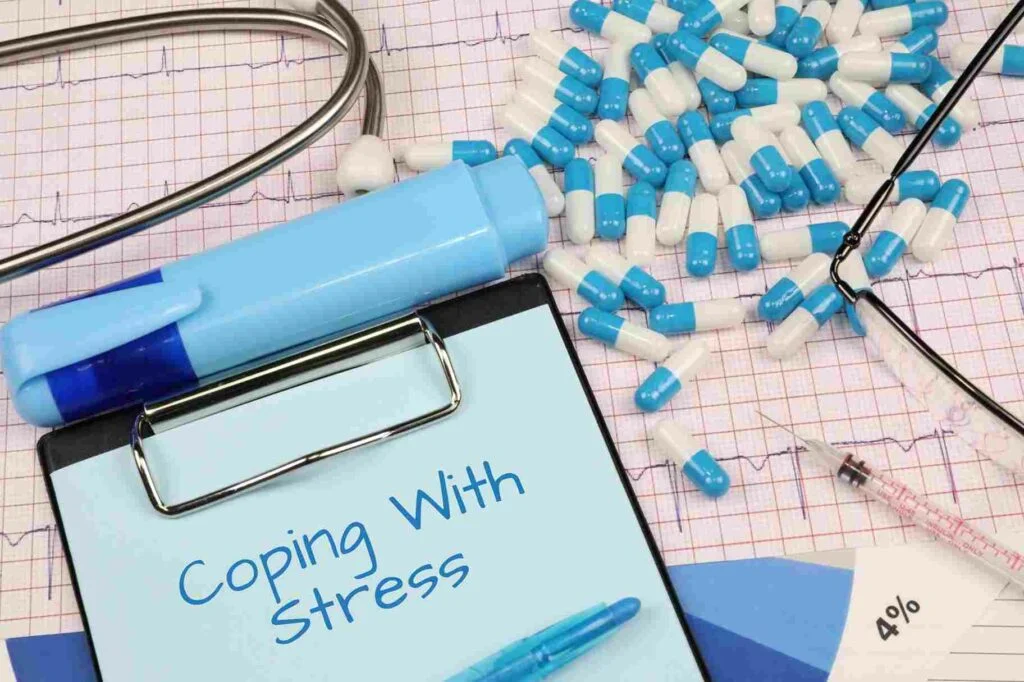Did you know that stress can lead to weight gain? It’s true! When we’re stressed, our bodies produce a hormone called cortisol. Cortisol causes us to store more fat, especially in the abdominal area. This is because cortisol tells the body to “store energy” so that we’ll be prepared for potential emergencies. While this is a natural response, it can lead to weight gain if it’s chronic. In this blog post, we will discuss 9 ways that stress can lead to weight gain and how to prevent stress weight gain.
How Stress Causes Weight Gain
Here are 9 ways that stress can lead to weight gain:
Increases cravings
 Cortisol causes us to crave sugary, salty, and fatty foods as our bodies are trying to find quick sources of energy. Studies have shown that people under more stress tend to eat more of these types of “comfort foods” than those who are less stressed.
Cortisol causes us to crave sugary, salty, and fatty foods as our bodies are trying to find quick sources of energy. Studies have shown that people under more stress tend to eat more of these types of “comfort foods” than those who are less stressed.
One study published in the International Journal of Eating Disorders found that women who were under more stress had a tendency to snack on high-calorie foods, leading to weight gain. What’s more, the study found that these women were more likely to turn to food to cope with stress than those with lower levels of stress.
Disrupts sleep patterns
When we’re stressed, it can be difficult to fall asleep and stay asleep. This can lead to less restful sleep, which can cause an overall decrease in energy expenditure and an increase in calorie intake. Studies have shown that people who don’t get enough sleep are more likely to be overweight than those who do.
One study published in the journal Sleep Medicine found that people who suffered from insomnia were three times more likely to be overweight or obese than those who got enough sleep. Furthermore, the study found that people who had difficulty falling asleep were twice as likely to be overweight than those who didn’t.
Causes hormonal changes
 Stress can cause a flurry of hormonal changes in the body, including an increase in cortisol and adrenaline. These hormones can trigger cravings for unhealthy foods and lead to an overall decrease in metabolism. Studies show that people under more stress tend to have higher levels of these hormones than those less stressed.
Stress can cause a flurry of hormonal changes in the body, including an increase in cortisol and adrenaline. These hormones can trigger cravings for unhealthy foods and lead to an overall decrease in metabolism. Studies show that people under more stress tend to have higher levels of these hormones than those less stressed.
One study published in the journal Stress found that people who were under more stress had higher levels of cortisol, which could lead to increased cravings for unhealthy foods and weight gain. What’s more, the study found that these people also had lower levels of leptin, a hormone that helps regulate hunger and satiety. This could lead to overeating and weight gain.
Leads to emotional eating
Stress can lead to emotional eating, which is when people turn to food as a way of coping with stress or other negative emotions. This type of eating often involves the consumption of high-calorie comfort foods, which can lead to weight gain. Studies have shown that emotional eaters tend to be heavier than those who don’t engage in emotional eating.
One study published in the journal Appetite found that people who engaged in emotional eating were more likely to have a higher body mass index (BMI) than those who didn’t. The study also found that emotional eaters were more likely to have an increased risk of developing obesity.
Encourages sedentary behavior
 When we’re stressed, it can be difficult to find the motivation or energy to exercise. This type of behavior can lead to weight gain as it often involves sitting for long periods of time and consuming more calories than are being burned. Studies show that people under more stress tend to be less active than those who are less stressed.
When we’re stressed, it can be difficult to find the motivation or energy to exercise. This type of behavior can lead to weight gain as it often involves sitting for long periods of time and consuming more calories than are being burned. Studies show that people under more stress tend to be less active than those who are less stressed.
One study published in the journal PLoS One found that people who were under more stress had a tendency to engage in more sedentary behavior, such as watching television and playing video games, than those who were less stressed. The study found that this sedentary behavior was associated with an increased risk of obesity. What’s more, the study also found that these people were less likely to engage in physical activity than those who had lower levels of stress.
Leads to disordered eating
Stress can also lead to disordered eating, which is when people engage in unhealthy eating behaviors such as binging and purging or skipping meals. These behaviors can have a negative impact on physical health, including weight gain. Studies show that people under more stress tend to be at higher risk of developing disordered eating behaviors than those who are less stressed.
One study published in the journal Eating Behaviors found that people who were under more stress were more likely to engage in disordered eating behavior than those who were less stressed. The study found that these people had an increased likelihood of skipping meals, binge eating, and purging. What’s more, the study also found that these behaviors were associated with an increased risk of obesity.
Leads to unhealthy behaviors
 Stress can also lead to other unhealthy behaviors, such as smoking or drinking alcohol. These habits can have a negative impact on physical health, including weight gain. Studies show that people who are under more stress tend to be more likely to engage in these behaviors than those who are less stressed.
Stress can also lead to other unhealthy behaviors, such as smoking or drinking alcohol. These habits can have a negative impact on physical health, including weight gain. Studies show that people who are under more stress tend to be more likely to engage in these behaviors than those who are less stressed.
One study published in the journal Drug and Alcohol Dependence found that people who were under more stress were more likely to smoke cigarettes and drink alcohol than those who had lower levels of stress. The study also found that these behaviors were associated with an increased risk of obesity. What’s more, the study found that those who engaged in these behaviors had a higher risk of developing other health problems, such as diabetes and heart disease.
Leads to an increased risk of disease
Stress can also lead to an increased risk of certain diseases. Studies show that people under more stress tend to be at higher risk of developing certain illnesses than those who are less stressed.
One study published in the journal Psychosomatic Medicine found that people who were under more stress had a higher risk of developing certain illnesses, such as cardiovascular disease and type 2 diabetes, than those who had lower levels of stress. The study found that these illnesses were associated with an increased risk of obesity. What’s more, the study also found that these illnesses were associated with an increased risk of death.
Leads to decreased immunity
 Stress can also lead to decreased immunity, which can have a negative impact on physical health, including weight gain. Studies show that people who are under more stress tend to be more likely to get sick than those who are less stressed.
Stress can also lead to decreased immunity, which can have a negative impact on physical health, including weight gain. Studies show that people who are under more stress tend to be more likely to get sick than those who are less stressed.
One study published in the journal Brain, Behavior, and Immunity found that people under more stress had lower immunity than those with lower levels of stress. The study found that these people were more likely to catch colds and other illnesses than those who had low-stress levels. What’s more, the study also found that these decreased immunity levels were associated with an increased risk of obesity. The study concluded that managing stress levels is essential for good physical health and should be addressed in any weight-loss program.
How To Prevent Stress Weight Gain?
Here are a few ways to prevent stress weight gain
Exercise regularly
One of the best ways to prevent stress and weight gain is to exercise regularly. Studies show that regular physical activity can help reduce stress levels and improve mental health. It’s also important to make sure that you are getting enough sleep. Lack of sleep can increase cortisol levels in the body and lead to increased stress levels.
Here are 5 tips to get started with regular exercise:
- Make a plan and set realistic goals: Before you start an exercise routine, make sure to create a plan and set realistic goals. This will help keep you motivated and keep your progress on track.
- Find a workout buddy: Working out with someone else can help make exercise more enjoyable and keep you motivated.
- Mix up your workouts: Don’t just stick to one activity – mix up your workouts. Try different activities like walking, running, swimming, or biking to get the most benefit.
- Mix up your routine: Don’t get stuck in a rut – mix up your routine to keep things interesting. Try different workouts, like yoga or Pilates, to add variety.
- Warm-up and cool-down: Make sure to warm up and cool down before and after your workouts. This will help reduce soreness and prevent injuries.
Eat a healthy diet
Eating a balanced, nutritious diet is another way to help prevent stress-related weight gain. Eating meals that are rich in protein and fiber can help keep you feeling full and energized throughout the day. Avoiding processed foods, sugary treats, and unhealthy fats can also help reduce your risk of gaining weight due to stress.
Here are 5 tips to get started with healthy eating:
- Plan ahead: Take the time to plan out your meals for the week. This will help make sure you are eating healthy, balanced meals every day.
- Focus on whole foods: Eating a diet that’s rich in whole foods, like fruits and vegetables, can help provide the vitamins and minerals your body needs.
- Limit processed foods: Limiting processed foods and sugary treats can help reduce your risk of gaining weight.
- Eat mindfully: Eating slowly and paying attention to how your body feels can help you stay in control of your portion sizes.
- Stay hydrated: Make sure to drink plenty of water throughout the day. This can help prevent overeating and keep you feeling full.
Practice relaxation techniques
Practicing relaxation techniques like meditation, yoga, or deep breathing can help reduce stress levels and prevent weight gain. Taking the time to step away from your daily routine can be an effective way to manage stress.
Here are 5 tips to get started with relaxation techniques:
- Find a quiet space: Find a quiet place where you can practice and take some time for yourself.
- Set a timer: Set a timer for 10 minutes. This will give you enough time to practice your relaxation techniques without feeling rushed.
- Focus on breathing: Take slow, deep breaths and focus on the breath going in and out of your body.
- Release tension: As you breathe, imagine any tension or stress being released.
- Reward yourself: After practicing your relaxation techniques, reward yourself with something special. This could be a hot bath or listening to your favorite song. Doing something to reward and acknowledge yourself for taking the time to practice relaxation can help motivate you to continue the practice.
Get enough sleep
Getting enough quality sleep is essential for managing stress levels and preventing weight gain. Try to go to bed and wake up around the same time each day, as doing so will help regulate your body’s circadian rhythm.
Here are 4 tips to get started with getting enough quality sleep:
- Set a bedtime routine: Establish a consistent bedtime routine that you can stick to each night.
- Turn off electronics: Avoid using phones, tablets, or computers at least an hour before bed. The light from these devices can disrupt your sleep.
- Create a sleep-conducive environment: Make sure your bedroom is dark, quiet, and cool to help promote quality sleep.
- Relax before bed: Take time to relax before bed by reading a book, listening to music, or practicing deep breathing. This can help you get into a relaxed state and prepare for sleep.
Talk to a therapist
Talking to a mental health professional can be an effective way to manage stress and prevent weight gain. A therapist can help you identify the sources of your stress.
Here are 5 tips to get started with talking to a therapist:
- Find a qualified provider: Do research ahead of time and make sure you are seeing someone. The person should be qualified to help.
- Prepare for the visit: Write down any questions or concerns you have ahead of time so that you are prepared to discuss them with the therapist.
- Be honest: Be open and honest about your feelings. This will help the therapist understand what is going on in your life and how to best help you.
- Set goals: When talking to the therapist, you can set goals for yourself that will help you manage stress.
- Follow-up: Be sure to follow up with your therapist on a regular basis so you can track your progress. This helps ensure you stay on track with your goals.
Building a strong network of friends and family members is another way to prevent stress-related weight gain. Connecting with people who understand your struggles can help provide emotional support and provide you with a sense of community.
Here are 5 tips to get started with seeking social support:
- Reach out: Don’t be afraid to reach out and talk to people who you trust.
- Connect online: Social media can be a great way to connect with people who are going through similar struggles.
- Meet in person: Meeting up with friends and family in person is a great way to stay connected.
- Seek out help: If you don’t feel like you have a strong network of social support, there are plenty of resources available to find it.
- Join a group: Local community groups or online forums can also be great ways to connect with people.
Find ways to relax
Finding ways to relax and unwind throughout the day can be beneficial for managing stress levels. Taking a walk in nature or listening to your favorite music can help you relax and give yourself a break from daily stressors.
Here are 4 tips to help you relax:
- Meditate: Take time each day to practice meditation or mindfulness.
- Spend time with friends: Spend quality time with friends or family members who make you feel supported and relaxed.
- Enjoy nature: Take a walk in the park or spend time outdoors to take in the beauty of nature.
- Read: Find a book that you enjoy and set aside time each day to escape into it and relax.
Conclusion
Stress-related weight gain can be a difficult issue to manage. It is possible to prevent it with the right strategies. Eating well and getting enough quality sleep is essential for managing stress levels and preventing unwanted weight gain. In addition, talking to a therapist and seeking social support can help provide additional tools. Finally, finding ways to relax and practice mindful eating can be beneficial for managing stress levels and preventing weight gain. With the right strategies in place, you can take control of your stress and not gain weight.
Consider contacting FitMantra for additional information on nutrition and fitness. You can also get in touch with their nutrition experts through our online nutrition counseling, who can guide you through the process and help you achieve your fitness goals. You can also lose weight with the help of our weight loss program. Download our Fitness app on Android to learn more about us.
